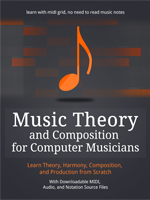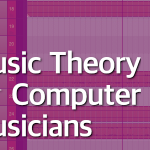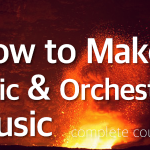If you want to compose your own orchestral or epic pieces, it’s essential to know at least the basics of music theory. No way around this, sorry :). Fortunately, there are some great books out there that can help you learn both the basics and the more advanced stuff, too. And while I try to publish this kind of knowledge on this website for free, it’s really worth it to read other sources, as well.
So let’s take a quick look at these books that I personally recommend.
By the way, you should know that you can learn music theory yourself. I mean, you don’t need to play an instrument (but this surely helps), or even attend music school. Books, online tutorials and courses are sufficient. I’ve learned music theory and music composition this way. So do not worry.
- I strongly believe in the following elements of learning music composition: theory learned from books; theory learned from more “show and tell” videos such as on YouTube or in online courses; and practice through making your own music.
Please note that I use Amazon’s affiliate links.
Music Theory for Dummies
This is the first book I recommend you read. As the title suggest, it covers the music theory – at least the basics of music theory. With this book, you will learn what are notes and rests, what are chords and how to build them, what are intervals, what is rhythm, and a lot more!
To me, music theory is like the theory of “bricks”. You learn what kind of bricks exist and what they are for. Music theory doesn’t teach you how to build a house with these bricks. You just learn the materials and the tools. And this book is great to learn these things.
Why do I like it?
Many “For Dummies” books are great introductions to the topics they write about. Music Theory for Dummies is no exception. It gives you the basics, step by step. And if you go through the music theory for computer musicians published on Orchestral Music School, Music Theory for Dummies will be a great addition explaining everything in a classic, sheet note form.
Music Composition for Dummies
When you’re done with learning about the bricks, you can learn how to build stuff with them. This is the next book you should read. It covers many topics such as composition, forms or even basics of orchestration.
Why do I like it?
I like this book because it takes the theoretical elements (bricks) you’ve learned about in the first book and shows you how to turn these elements into a real composition. It’s more focused on traditional forms and popular music, but if you want to learn how to make epic music, you have to start somewhere.
Music Theory for Computer Musicians
The con of the two books above is the fact that they all use standard musical notation. This may not be desired by people without previous musical background. Music Theory for Computer Musicians by Michael Hewitt is the first of three books for… well, computer musicians. It focuses on providing knowledge for those who are more accustomed to midi grid.
Still, it’s a good source of knowledge for beginners. What I have done personally, and what I recommend to you, as well, is to read this book third – first, go through “For Dummies” series, and then jump right into Hewitt’s works.
Why do I like it?
Because it presents music theory being aware that the readers may prefer the midi grid.
The problem with this book, and other books in this “For Computer Musicians” series, is the availability. At the moment of writing this article, the book is available on Amazon, but it wasn’t a few months ago. The other two books are no longer available on Amazon except used copies. I guess they’re out of print. But if you can find them somewhere, then you should definitely buy your own copy :).
Music Composition for Computer Musicians
Once you know the theory, you jump into composition. So after reading previous three books, you may want to see a different perspective and read this second book by Hewitt. Again, it covers the composition part and it’s meant for those who prefer the midi grid over standard notation.
The biggest problem with this book is that it has too much stuff about drums programming, but otherwise, it’s a great resource.
Why do I like it?
Because it presents music composition being aware that the readers may prefer the midi grid.
Harmony for Computer Musicians
This is my favorite book by Hewitt. It focuses on harmony, that is: the chords. Everything from standard triads to sevenths, ninths and so on. And again, it all presented with pictures of the midi grid. There’s nothing more to say about this book, it’s harmony and chords in user friendly way.
The book comes with a CD that stores midi source files and additional materials and exercises.
Another must read!
Why do I like it?
It’s the only book I’ve read about harmony that presents everything on a midi grid – it actually makes things a LOT easier to understand if you’re not into traditional notation. I mean, the two previous books are nice to include the grid, but this book is very, very useful to understanding the foundation of music – chords and harmonies.
The Guide to MIDI Orchestration
The fourth edition of a very popular book. If you’ve learned the basics of music theory and music composition, and you want to make orchestral music, then you need to at least know the basics of working with a computer orchestra and virtual orchestration.
Why do I like it?
“So how do they make this orchestral music on a computer”, “what is legato”, “what’s inside the orchestra”, “how do I…” – many of such questions are answered through this book. Being aware of what’s possible on a basic level is a good start.
Summary
And there you have it, a list of basic books. If your budget is limited or you’re not a fan of reading, then I recommend you read at least the Music Theory for Dummies and Harmony for Computer Musicians. There’s a lot you can do with the knowledge from these two books.
What other books for beginners would you recommend?
Don't forget to become a fan on Facebook and subscribe to new posts via RSS or via email.









